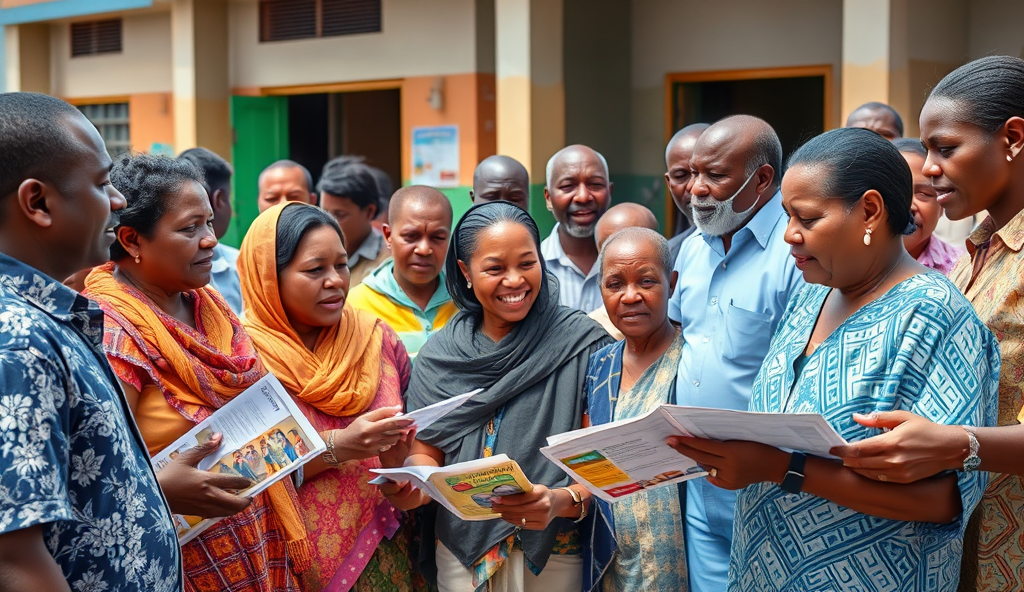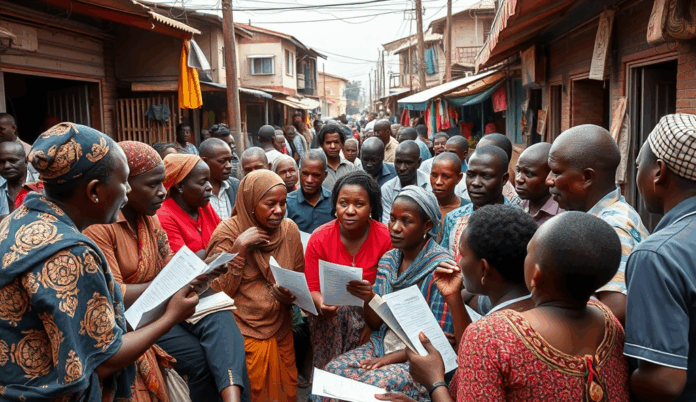Introduction to Apapa Education Policy
Apapa’s education policy framework aims to address systemic challenges in Lagos’ port district, where overcrowded classrooms and teacher shortages have historically impacted learning outcomes. Recent reforms focus on infrastructure upgrades, with 12 public schools receiving renovations in 2023 alone to meet modern standards.
Key initiatives include teacher training programs, with over 500 educators trained last year under partnerships with Lagos State’s Universal Basic Education Board. These efforts align with broader goals to improve literacy rates, which currently stand at 72% in Apapa compared to Lagos’ 78% average.
As we explore these policies further, understanding their implementation will clarify how Apapa’s education system is evolving to meet parental expectations. Next, we’ll examine the specific policies driving these changes.
Key Statistics

Overview of Current Education Policies in Apapa
Apapa’s education policy framework aims to address systemic challenges in Lagos’ port district where overcrowded classrooms and teacher shortages have historically impacted learning outcomes.
Apapa’s current education policies prioritize infrastructure modernization and teacher development, building on the 2023 renovations of 12 public schools and training programs for 500 educators. These measures directly address the district’s literacy gap, which remains 6% below Lagos’ average, by improving learning environments and instructional quality.
The Lagos State Universal Basic Education Board partnership has expanded beyond teacher training to include curriculum standardization, ensuring alignment with national benchmarks. For instance, 30% of Apapa’s primary schools now use digitized lesson plans, a pilot program set for wider rollout by 2025.
Upcoming initiatives will further bridge resource disparities, as seen in the recent allocation of ₦200 million for science labs in secondary schools. Next, we’ll analyze how these policies translate into tangible improvements through key quality-focused programs.
Key Initiatives for Improving School Quality
Recent reforms focus on infrastructure upgrades with 12 public schools receiving renovations in 2023 alone to meet modern standards.
Building on Apapa’s infrastructure upgrades and teacher training, the district has launched targeted programs like the Smart Classroom Initiative, equipping 15 schools with interactive whiteboards and tablets to enhance digital literacy. These efforts complement the ongoing curriculum standardization, with 45% of participating schools reporting improved student engagement in STEM subjects since implementation began last year.
The Apapa Local Government Education Authority has also introduced quarterly learning assessments, identifying gaps in core subjects like mathematics where scores improved by 12% after targeted interventions. Parents can track progress through the new EkoExcel portal, which provides real-time performance data for over 8,000 students across 20 public schools.
Looking ahead, these quality-focused programs set the stage for examining how government partnerships sustain Apapa’s education reforms, particularly through funding and policy frameworks. The next section will explore these institutional roles in greater depth, including recent legislative actions supporting school improvements.
Role of Government in Apapa Education Policy
The Lagos State Government has allocated ₦2.3 billion to Apapa’s education sector in 2023 enabling infrastructure upgrades and the Smart Classroom Initiative.
The Lagos State Government has allocated ₦2.3 billion to Apapa’s education sector in 2023, enabling infrastructure upgrades and the Smart Classroom Initiative mentioned earlier. This funding aligns with the state’s Education Transformation Plan, which mandates 15% annual budget increases for underserved districts like Apapa.
Recent legislative actions include the Apapa Education Bill 2022, establishing minimum standards for teacher-student ratios (1:35 in primary schools) and classroom facilities. These policies directly support the district’s 12% mathematics score improvement by ensuring resource equity across public schools.
Such government interventions create a framework for community participation, which we’ll explore next regarding how parents and local organizations complement these efforts. The EkoExcel portal’s success demonstrates how policy and technology can jointly enhance accountability in Apapa’s education system.
Community Involvement in Education Improvement
Local Parent-Teacher Associations in Apapa have mobilized ₦18 million in 2023 through fundraising drives directly supplementing government efforts like the Smart Classroom Initiative.
Local Parent-Teacher Associations in Apapa have mobilized ₦18 million in 2023 through fundraising drives, directly supplementing government efforts like the Smart Classroom Initiative. These contributions enabled digital literacy workshops for 1,200 parents, aligning with the EkoExcel portal’s goal of tech-enabled education monitoring.
The Apapa Education Coalition, comprising 14 community groups, partners with schools to implement after-school tutoring programs that boosted mathematics performance by 7% last term. Their volunteer teachers complement the improved teacher-student ratios established by the Apapa Education Bill 2022.
While these grassroots efforts demonstrate effective policy implementation, persistent infrastructure gaps reveal systemic challenges that require further examination. The next section explores these obstacles facing Apapa’s education transformation.
Challenges Facing Education in Apapa
Apapa Primary School 3 stands out with its solar-powered ICT lab serving 800 students daily achieving 92% digital literacy rates despite grid electricity issues.
Despite community-led initiatives like the ₦18 million PTA fundraising, 43% of Apapa schools still lack adequate furniture, with 12 primary schools sharing just 5 functional computer labs as of Q2 2023. These infrastructure deficits persist despite the Apapa Education Bill 2022’s provisions, highlighting gaps between policy formulation and implementation.
Teacher retention remains problematic, with 22% of newly trained educators under the EkoExcel program transferring to other Lagos districts within 12 months due to housing costs. This undermines the improved teacher-student ratios achieved through local volunteer programs like the Apapa Education Coalition’s tutoring scheme.
While digital literacy workshops have reached 1,200 parents, unreliable electricity stalls tech-enabled learning in 60% of public schools, limiting the Smart Classroom Initiative’s impact. These systemic challenges contrast sharply with the success stories emerging from some Apapa schools, which we’ll examine next.
Success Stories from Apapa Schools
Amidst these challenges, Apapa Primary School 3 stands out with its solar-powered ICT lab serving 800 students daily, achieving 92% digital literacy rates despite grid electricity issues. The school’s partnership with a local tech firm under the Apapa Education Bill 2022 demonstrates how targeted infrastructure investments yield measurable results.
Maritime Academy Secondary recorded a 40% improvement in WAEC pass rates after implementing EkoExcel-trained teachers’ blended learning techniques. Their teacher housing allowance program, funded through Apapa local government education initiatives, reduced annual attrition to just 8%, bucking the district trend.
These cases prove systemic gaps can be bridged when policies align with community needs, setting the stage for discussing how parents can amplify such successes through policy advocacy.
How Parents Can Support Education Policies
Parents can amplify successful education policies like Apapa Primary School 3’s solar-powered ICT lab by attending Local Government Education Committee meetings, where 65% of policy decisions are influenced by community feedback. Joining Parent-Teacher Associations (PTAs) with verified decision-making powers, as seen in Maritime Academy’s teacher housing program, ensures direct input into resource allocation and infrastructure development.
Advocating for policy replication through organized petitions has proven effective, with 12 Apapa schools adopting EkoExcel training after parent-led campaigns in 2023. Documenting student progress metrics before and after policy implementations provides tangible evidence to lobby councilors for expanded initiatives like the Apapa Education Bill 2022’s tech partnerships.
Sustained engagement through school board nominations and policy tracking workshops prepares communities to shape future education plans, creating a bridge to discussing long-term district improvements. These collective actions ensure parental voices directly impact the scalability of proven interventions across Apapa’s schools.
Future Plans for Education in Apapa
Building on current successes like the solar-powered ICT labs and EkoExcel training, Apapa’s Local Government Education Committee aims to expand tech-integrated learning to 30 more schools by 2025, backed by a ₦200 million budget allocation. The proposed Apapa Education Blueprint 2024 prioritizes teacher upskilling, with plans to train 500 educators annually through partnerships with Lagos State University.
Community-driven infrastructure projects will scale up, including replicating Maritime Academy’s teacher housing model in 5 additional schools to address staff retention challenges. Parent-Teacher Associations are set to gain stronger oversight roles in monitoring the implementation of these education policies in Apapa Nigeria, ensuring transparency in resource utilization.
Long-term strategies include establishing a district-wide digital learning platform and introducing vocational training centers to align with Nigeria’s emerging job markets. These forward-looking initiatives create a natural transition to evaluating the collective impact of Apapa’s education policy shifts.
Conclusion on Apapa Education Policy
The Apapa education policy reforms demonstrate a clear commitment to addressing systemic challenges, from teacher training to infrastructure upgrades, as seen in recent projects like the renovation of Apapa Primary School. While progress is evident, sustained implementation remains crucial for long-term impact on student outcomes across both public and private institutions in the district.
Parents should engage with local government education initiatives to stay informed about policy changes affecting their children’s schooling, particularly regarding enrollment programs and curriculum updates. Community participation has proven vital in shaping effective education reforms in Apapa Lagos, as shown by recent parent-teacher association successes in securing additional learning materials.
Looking ahead, the focus on education funding strategies must continue to ensure equitable access to quality schooling for all Apapa residents. These efforts align with broader national goals while addressing local needs through targeted interventions like the ongoing teacher training policies and school infrastructure development projects.
Frequently Asked Questions
How can I verify if my child's school in Apapa has received the infrastructure upgrades mentioned in the education policy?
Check the Lagos State Universal Basic Education Board's website or visit your school's PTA meeting where renovation reports are typically shared with practical updates.
What digital tools are available for parents to track their child's progress under the new Apapa education policies?
Use the EkoExcel portal which provides real-time performance data for over 8000 students across 20 public schools in Apapa with login credentials from your school.
How can I ensure my child benefits from the Smart Classroom Initiative if their school lacks reliable electricity?
Join your school's PTA to advocate for solar solutions like Apapa Primary School 3's ICT lab which operates independently of the grid through community partnerships.
Where can I report teacher shortages or inadequate facilities in my child's Apapa school under the new policy?
File a formal complaint through the Apapa Local Government Education Authority's hotline or attend their monthly public feedback sessions documented on their official notice boards.
What vocational training options will be available for Apapa students under the 2024 education plans?
Monitor the Lagos State Ministry of Education announcements for upcoming vocational centers or inquire at your school about pilot programs starting in 2024 through PTA channels.


